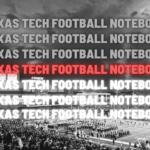With just two games left in the season, we’ve noticed some positives and negatives with this football team. When there’s a coaching change, we like to notice the differences between the two teams and see what direction the team is going.
For example, this team is averaging about 15 yards less in penalties per game this season than the last two seasons. Their defense is allowing the least amount of points in a decade. The Red Raiders are getting solid contributions from their depth whenever the starters get hurt. This team has shown the ability to come back.
However, the most concerning thing I have noticed so far this season is their performance in close games. According to our man Spencer, before Wells took over the Texas Tech job, he was 7-15 in one score games, which includes 2-13 on the road.
So far this season, Wells has been 0-3 in one score games, including two on the road. Not to mention Tech was leading in the fourth quarter against Arizona. There have been mistakes made, untimely turnovers, questionable decisions and poor execution.
You have a legit argument that one was due to a bad call, but Tech had chances to end it and Baylor did drop a TD at the end of regulation to keep it alive.
Texas Tech isn’t going to be Alabama, Clemson or Ohio State. Unless there is a humongous swing in recruiting, they aren’t going to be on the same talent level. So they’re going to have to likely play in closer games, and Tech is going to have to win them.
On Saturday there were a few mistakes made that could’ve swung the game. Duffey barely overthrew Rigdon on a completion that should’ve been a touchdown (instead, Tech had to punt). Mannix fumbled the ball when Tech needed to drive down the field to score.
The one that got me though was a coaching decision. Down five after scoring a touchdown with 28 points left in the game, Wells decides to go for two and doesn’t get it. I may have only been watching football for a couple decades, but everything I learned tells me not to go for two there.
Here was Wells’ explanation on why they went for two:
Wells on the decision to go for two early: “That’s a little early. That’s one of the earlier times I’ve ever started going for two. But at that point, we weren’t stopping them on defense, and I thought it was really going to get into a score-fest.
— Don Williams (@AJ_DonWilliams) November 16, 2019
First of all, if you plan on scoring again, just go for two later. You never know if the opposition will mess up and therefore, not force you to go for two. The only case I see doing is if it’s a low scoring game and you think you may only get one or two more shots.
Secondly, he mentioned the defense struggling. Although they did allow 24 points on their first four drives (one TD thanks to an unlucky tipped passed), they only scored three points the past three drives, two of which ended in punts. TCU even punted next possession and only scored six more points.
If they kicked the extra point there, they don’t go for two and kick the extra point later on. I know he missed one earlier, but what’s the odds of missing two more kicks from inside the five perfectly lined up. Then we’re talking about a tied game and who knows what happens.
On the bright side, Wells did go 2-1 in close games his final season at Utah State, with the one loss coming to a Power Five school in Michigan State (Utah State was not a Power 5 school). So it appears he turned it around his final season there.
Hopefully this is a situation where he just needs more time to establish the culture and change the program. Wells took over a team that went 7-6 and 11-2 the two season prior, and went 9-5 and 10-4 after. But he had three losing seasons before he went 11-2 last season.
Wells didn’t take over a team that won double digit games. He took over one that hasn’t won double digit wins in a decade, has had an overall losing record during the 2010’s, and has had some bottom recruiting classes overnight. Not every rebuild is going to be magical and happen in one season. Have faith.
There are some positives to take away from this season, but if the Red Raiders can prevent one turnover, or one coaching blunder, or execute a little better, we’re looking at a whole different team this year and in future years.










